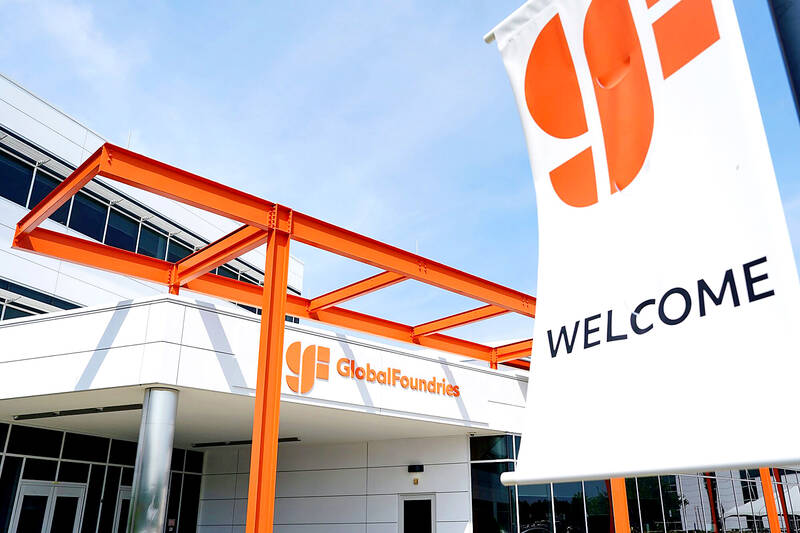The US government said yesterday that it has finalized a grant with chipmaker GlobalFoundries Inc to support its semiconductor manufacturing investments, as US President Joe Biden works to secure parts of his legacy before Donald Trump’s White House return.
The binding contract provides up to US$1.5 billion in direct funding and comes under the CHIPS and Science Act, a suite of incentives to boost research and US semiconductor production.
The US produces just about 10 percent of the global supply of chips, relying on East Asia for 75 percent of world production, the White House noted in 2022.

Photo: Cindy Schultz, Bloomberg
"By investing in GF’s domestic manufacturing capabilities, we are helping to secure a stable domestic supply of chips that are found in everything from home electronics to advanced weapons systems," US Secretary of Commerce Gina Raimondo said.
The finalized award comes after a preliminary agreement announced in February, and means that funds can begin flowing when milestones are reached.
The Biden administration has unveiled billions in grants through the CHIPS Act but much of the funds have not been disbursed.
Officials have since been working to get deals across the finish line.
The latest announcement comes about two months before US president-elect Trump, who has previously criticized the CHIPS Act, takes office.
The award is aimed at supporting broader investment of around US$13 billion by GlobalFoundries (GF) over the next 10 years or so, in its manufacturing sites in New York and Vermont, the commerce department said.
This will improve US "competitiveness in current-generation semiconductor production," the department added.
The sites produce semiconductor tech in key areas like automotive, aerospace and defense, as well as communications.
There are currently just four companies outside China that provide "current and mature foundry capabilities at the scale of GF," the department said.
GF is the only one of these firms headquartered in the US.
"We are strategically strengthening every part of the semiconductor supply chain to ensure we meet our national security objectives and have the ability to out-compete and out-innovate the rest of the world," Raimondo added in a statement.
The aim is to boost economic and national security by increasing domestic manufacturing capacity and bringing back technologies key to US defense and intelligence communities.
The company’s investment is estimated to generate about 1,000 manufacturing jobs across both sites.
Last week, US officials finalized a grant to Taiwan Semiconductor Manufacturing Co (台積電) as well, for up to US$6.6 billion in direct funding to help build facilities on American soil.

Anna Bhobho, a 31-year-old housewife from rural Zimbabwe, was once a silent observer in her home, excluded from financial and family decisionmaking in the deeply patriarchal society. Today, she is a driver of change in her village, thanks to an electric tricycle she owns. In many parts of rural sub-Saharan Africa, women have long been excluded from mainstream economic activities such as operating public transportation. However, three-wheelers powered by green energy are reversing that trend, offering financial opportunities and a newfound sense of importance. “My husband now looks up to me to take care of a large chunk of expenses,

SECTOR LEADER: TSMC can increase capacity by as much as 20 percent or more in the advanced node part of the foundry market by 2030, an analyst said Taiwan Semiconductor Manufacturing Co (TSMC, 台積電) is expected to lead its peers in the advanced 2-nanometer process technology, despite competition from Samsung Electronics Co and Intel Corp, TrendForce Corp analyst Joanne Chiao (喬安) said. TSMC’s sophisticated products and its large production scale are expected to allow the company to continue dominating the global 2-nanometer process market this year, Chiao said. The world’s largest contract chipmaker is scheduled to begin mass production of chips made on the 2-nanometer process in its Hsinchu fab in the second half of this year. It would also hold a ceremony on Monday next week to

TECH CLUSTER: The US company’s new office is in the Shalun Smart Green Energy Science City, a new AI industry base and cybersecurity hub in southern Taiwan US chip designer Advanced Micro Devices Inc (AMD) yesterday launched an office in Tainan’s Gueiren District (歸仁), marking a significant milestone in the development of southern Taiwan’s artificial intelligence (AI) industry, the Tainan City Government said in a statement. AMD Taiwan general manager Vincent Chern (陳民皓) presided over the opening ceremony for the company’s new office at the Shalun Smart Green Energy Science City (沙崙智慧綠能科學城), a new AI industry base and cybersecurity hub in southern Taiwan. Facilities in the new office include an information processing center, and a research and development (R&D) center, the Tainan Economic Development Bureau said. The Ministry

ADVERSARIES: The new list includes 11 entities in China and one in Taiwan, which is a local branch of Chinese cloud computing firm Inspur Group The US added dozens of entities to a trade blacklist on Tuesday, the US Department of Commerce said, in part to disrupt Beijing’s artificial intelligence (AI) and advanced computing capabilities. The action affects 80 entities from countries including China, the United Arab Emirates and Iran, with the commerce department citing their “activities contrary to US national security and foreign policy.” Those added to the “entity list” are restricted from obtaining US items and technologies without government authorization. “We will not allow adversaries to exploit American technology to bolster their own militaries and threaten American lives,” US Secretary of Commerce Howard Lutnick said. The entities